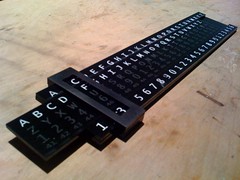 Bre Pettis, the uber-DIY hacker of NYC’s Resistor space and self-replicator guru Zach Hoeken are launching Thingiverse today.
Bre Pettis, the uber-DIY hacker of NYC’s Resistor space and self-replicator guru Zach Hoeken are launching Thingiverse today.
Thingiverse is an “object sharing” site that enables anyone to upload the schematics, designs, and images for their projects. Users can then download and reuse the work in their projects using their own laser cutters, 3D printers, and analog tools. Think of it as a Flickr for the Maker set.
Besides implementing our licenses, Bre and Zach have also gone the distance and allowed users to license works under the GNU GPL, LGPL, and BSD licenses, as well as allowing them to release works into the public domain. Thingiverse uses our license wrappers for each of these licenses thereby enabling automatic indexing by machines like search engines.
Pushing the envelope even further, Thingiverse also fully implements our RDFa specification (just take a look at the source of any page with a CC license to see RDFa in action) for expressing licensing and authorship information on the semantic web. This means that aside from telling machines that a work is licensed under CC, Thingiverse also tells machines the title of a work, its author, and other interesting semantic information.
If you’re looking for a fantastic example of how to implement the commons on a platform designed for sharing creativity, look no further than Thingiverse.
(The Polyalphabetic Substitution Cipher Slide Rule by nickfarr under CC BY-SA)






